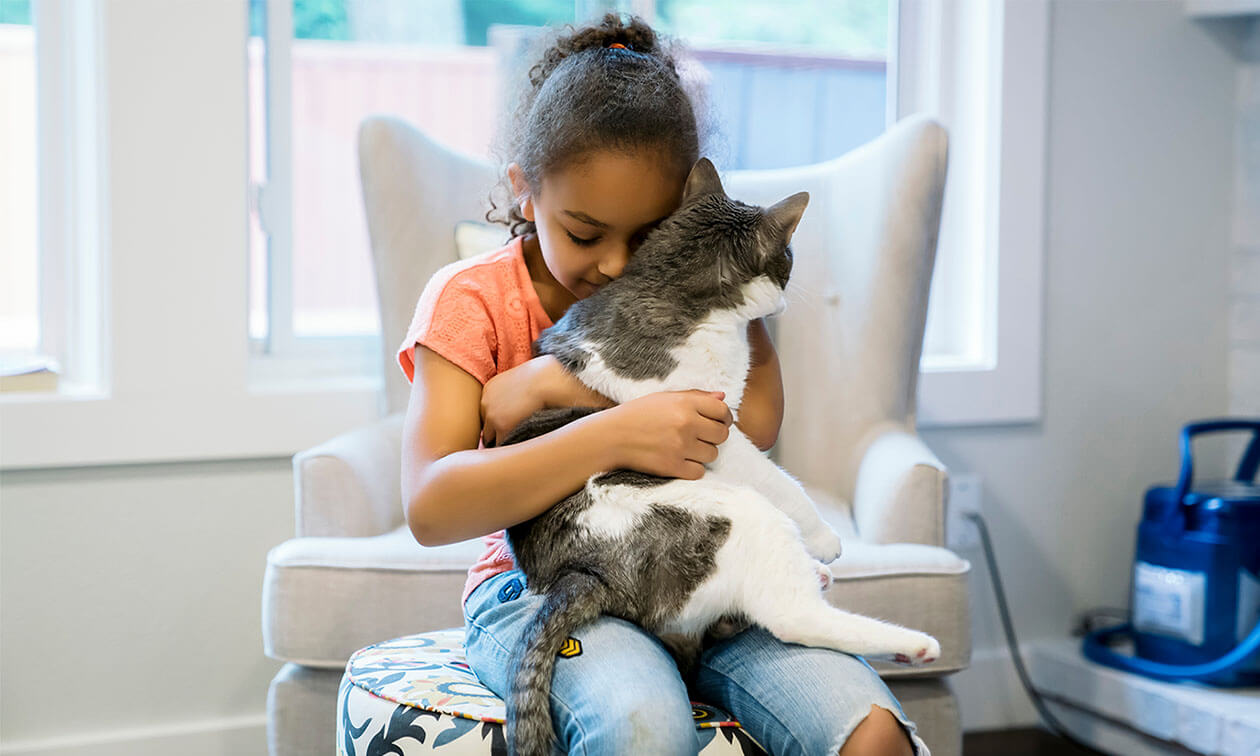If you're considering adding a cat to your family, you're certainly thinking about the type of cat that will fit best with your lifestyle – this is especially true if you have children of any age. You want a cat who will feel safe and secure with all the activity of a busy household, participate in play and training with the kids, perhaps not be too needy if you're always on the move, and most importantly, enjoy their life with you. All cats can be great with children, but certain breeds may have characteristics better suited for children. Let's look at some cat breeds with family-friendly characteristics.
How Important Is Breed When Choosing a Cat?
First and foremost, breed isn't the primary determining factor in a cat's behavior, needs, and preferences. The cat's history, early and recent socialization, and unique personality play a role. Purebred cats also aren't all that common and most housecats are mixed breeds. Even if your cat looks like a Ragdoll or Maine Coon, their DNA profile may include many different breeds. You can certainly use breed as a general guideline for the characteristics your cat may have.
You also want to ask about their personality, how they react in different situations, and even try to spend some time with them before making your decision. Even if your new cat surprises you with unexpected reactions, fears, or energy levels, you can use things like play, enrichment, positive desensitization, and training to help your cat adjust to your lifestyle. You can also make small lifestyle adjustments to help meet your cat's needs.
What Cat Characteristics Are Best for Families and Kids?
This question can be more complicated than you might think. Your lifestyle and environment will change as your children grow up, which can change the characteristics you'd like in a cat. If you have babies or toddlers at home, you may want a cat who requires less time and attention from you, isn't vocal, but loves quiet snuggle time. As your children age, they may want to be more hands-on with your cat, making sturdiness and patience more important breed qualities. They may also be interested in helping with play and training, making having a high-energy cat in your home easier. If you have multiple children or a busy household, you may want a cat who can go with the flow and is less likely to be skittish with loud sounds, strangers, and lots of buzzing around.
The important thing to remember is that your cat has needs you'll have to meet. It's best to think ahead. What might your busiest, loudest, most active household look like in the future? What time will you and your family have to engage with your cat? How many people will be running around your home daily? These questions will help you determine if an active or easy-going cat might be best for you.
Active Cat Breeds
Certain breeds, and most cats under two years old, are high-energy. These cats often need lots of dedicated play and mental enrichment from their people. They tend to be curious about new things, which can be helpful for big families with lots going on or older children who know how to interact with a curious cat. For all these breeds, daily play sessions are essential, and two to three times a day may be necessary. Use a wand toy so you can replicate their natural hunting sequence and include lots of mental enrichment, too, like food puzzles, self-play toys, and training.
- Abyssinian. The Abyssinian is highly active. They're curious and want to be where the action is.
- Burmese. These cats tend to act like kittens even as they get older – that means lots of energy. They're also smart, so they do well with training.
- Manx. The cat with no tail, Manx are often considered to be dog-like. They're very social, trainable, and playful.
- American Shorthair. Smart and playful but gentle, American Shorthair cats can be wonderful family companions.
- Devon Rex. If you want a fun, silly cat, this might be right up your alley. They're playful, sweet, and like to learn.
Be mindful that active cats whose needs aren't being met with play and mental enrichment can often get overly aggressive with play — stalking, pouncing, and sometimes biting or scratching too hard. They'll do this with anything that moves, whether other pets or people. This is a concern in any home, especially those with young children or seniors so it’s important to make cat activities a priority every day.
Easy-Going Cat Breeds
For active families, those with young children, or those who don't have a ton of time, a mellow cat may be the right fit. These cats are less reactive to loud sounds, changes in environment and schedule, kids running around, etc. They can also be more comfortable with handling and may enjoy snuggling just as much as a play session. That doesn't mean they're lazy, though, as they can still be highly active and need plenty of mental and physical enrichment.
- Maine Coon. This large cat is hefty, but laid back and curious. They do well with training and may even enjoy splashing around in water.
- Ragdoll. With their beautiful, masked faces, Ragdolls are a puddle of snuggles. They're a sturdy, larger breed, which can be helpful with younger children. They're also extremely friendly and love attention.
- Birman. These cats are generally very friendly and can adapt easily to different situations, but they do sometimes attach themselves to one person in the home.
- American Shorthairs. This breed makes both lists because they can be active and tolerant, but also highly affectionate and relaxed.
- Tonkinese. The quieter relative of the Siamese, Tonks are known to be extremely affectionate and smart.
Remember all cats are individuals and have their own personalities so whether you want an easy going or active cat, a domestic shorthair cat from a shelter or rescue will fit these needs.
Medical Considerations
Just as breed can somewhat influence personality and energy levels, it can also impact a cat's health and the medical support they may need. It's important to research any breed you're considering and talk with the breeder and your veterinarian about your questions and concerns. Ask your veterinarian about the breeding pair's health and whether they've tested for genetic health markers.
ZPC-03218



